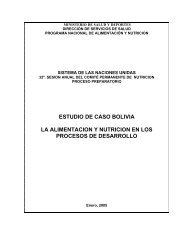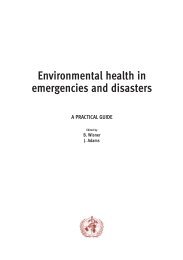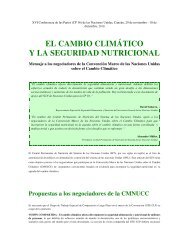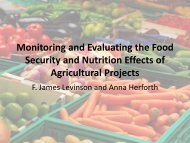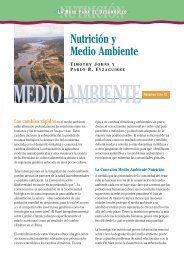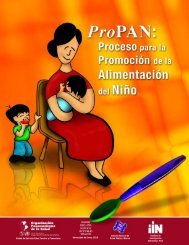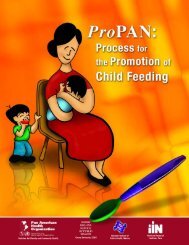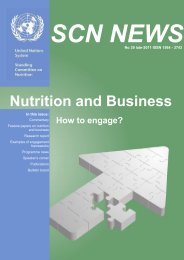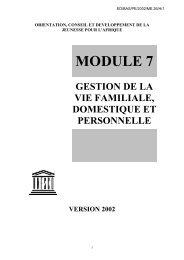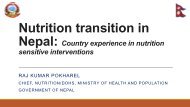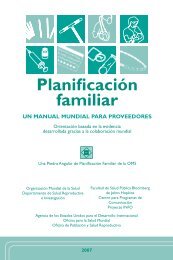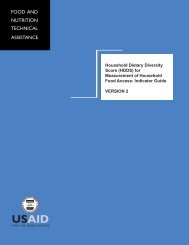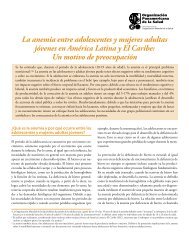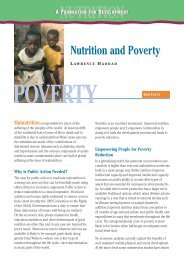SCN News No 36 - UNSCN
SCN News No 36 - UNSCN
SCN News No 36 - UNSCN
You also want an ePaper? Increase the reach of your titles
YUMPU automatically turns print PDFs into web optimized ePapers that Google loves.
58<br />
WORKING GROUPS<br />
www.unsystem.org/scn<br />
WORKING GROUP ON NUTRITION, ETHICS AND HUMAN RIGHTS<br />
Chair: Margret Vidar (FAO), Co-Chairs: Asako Hattori (OHCHR), Marlis Lindecke (GTZ), Flavio Valente (FIAN), Rapporteur: Marc Cohen (IFPRI)<br />
Topics discussed<br />
Lancet Nutrition Series<br />
Discrimination and Undernutrition<br />
Updates from four Task Forces<br />
Indigenous People<br />
International Dimensions<br />
Corporate Food Sector<br />
Capacity Development<br />
Defining Fundamental Right to be<br />
Free from Hunger<br />
Book launch 4 March: Global Obligations<br />
for the Right to Food (p.78)<br />
Recommendations to <strong>SCN</strong><br />
1. For future <strong>SCN</strong> Sessions, to<br />
extend invitation to WGNEHR presession<br />
meeting<br />
2. Efforts to review <strong>SCN</strong> in the<br />
context of an overall assessment of<br />
the international nutrition system<br />
should be carried out in a<br />
transparent manner; recognize the<br />
core role of <strong>SCN</strong> in harmonizing<br />
the efforts of UN agencies in the<br />
field of nutrition, with the advice of<br />
bilateral partners and civil society;<br />
and acknowledge the prominent<br />
place of human rights on the<br />
agenda of the United Nations and<br />
in the vision and mission of <strong>SCN</strong>.<br />
3. <strong>SCN</strong> should continue to focus on<br />
economic, social, political and<br />
cultural factors as causes of<br />
malnutrition<br />
4. Other <strong>SCN</strong> Working Groups should<br />
pursue their particular focus within<br />
a human rights perspective<br />
Planned activities<br />
(extract from 2008 Work Plan)<br />
1. Monitor developments on global<br />
obligations for the right to food<br />
2. Continue Task Forces’ work<br />
3. Explore activities to address the<br />
human rights implications of readyto-use<br />
therapeutic foods<br />
For more details, please see Working<br />
Group report, presentations and<br />
background documents<br />
<strong>SCN</strong> NEWS # <strong>36</strong> back to contents<br />
Highlights from discussions 2 and 4 March<br />
Updates and work plans from the Task Forces<br />
• TF on the Human Rights Responsibilities of the Corporate Food Sector will<br />
focus on regulation of industry marketing practices, especially as regards<br />
pressure on children, and may change its name accordingly. A legal expert<br />
will be invited to serve as vice-coordinator.<br />
• TF on the Capacity Development for Human Rights in Nutrition will continue<br />
to bring a human rights perspective to nutrition meetings, take part in<br />
training initiatives, and assist in the development of curricula on the linkages<br />
between food/nutrition and human rights.<br />
• TF on Indigenous Peoples and the Right to Adequate Food will complete its<br />
study of this topic and present it, together with policy recommendations, at<br />
the IUNS meeting. The <strong>36</strong> th Session of the <strong>SCN</strong> will receive an update.<br />
• TF on the Fundamental Right of Everyone to be Free from Hunger will<br />
continue efforts to clarify the content of this right.<br />
Discrimination and undernutrition. Veena Shatrugna (India National Institute<br />
of Nutrition) presented data from India, demonstrating the role of cultural<br />
factors for good nutrition.<br />
Recommendations on the Global Obligations for the Right to Food,<br />
available from WG-NEHR webpage based on the book by the Task Force,<br />
concern starting a process towards clarifying international or extraterritorial<br />
obligations under the Covenant on Economic, Social and Cultural Rights of<br />
States’ Parties as well as for international agencies and NGOs in relation to<br />
food and nutrition. The UN Committee on Economic, Social and Cultural Rights<br />
(CESCR) should prepare a General Comment on this theme, taking into<br />
account ongoing work in the Human Rights Council and other relevant bodies.<br />
Future General Comment should contain guidelines for international or<br />
extraterritorial obligations.<br />
Comments to the Lancet Nutrition Series: The WG welcomed attention to<br />
the serious problem of maternal and child undernutrition in developing countries<br />
in such a prestigious health sciences journal. The WG appreciated in particular<br />
the call for research into the accountability and responses of governments<br />
to their nutrition-relevant commitments under international conventions<br />
such as the un convention on the rights of the child and the convention on the<br />
elimination of all forms of discrimination against women. However, the WG<br />
also had a number of concerns about the series as a whole, including:<br />
• It tends to take a top-down approach to issues, focusing on getting the<br />
interventions right, and frequently views malnourished people as clients and<br />
beneficiaries, rather than human beings with rights who are key actors in<br />
achieving their own development. Instead, it tends to re-medicalize<br />
discussion on nutrition and miss out on the important role and contribution<br />
of policy and legal frameworks, including those on human rights in nutrition.<br />
• It tends to neglect the important role that the U.N. system has played and<br />
must continue to play in overcoming undernutrition.<br />
• The series seems to blame the nutrition community for the persistence of<br />
undernutrition, while it neglects social, political, economic, and cultural<br />
determinants of malnutrition.<br />
See also: <strong>SCN</strong> Working Groups on Nutrition, Ethics and Human Rights and on<br />
Nutrition Throughout the Life Cycle. Human Right of Children and Adolescents<br />
to Adequate Food and to be Free from Obesity and Related Diseases: The<br />
Responsibilities of Food and Beverage Corporations and Related Media and<br />
Marketing Industries. Joint Statement, 33 rd <strong>SCN</strong> Session, Geneva, 2006.



